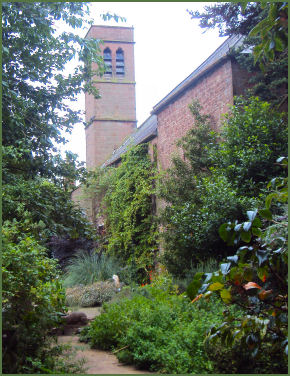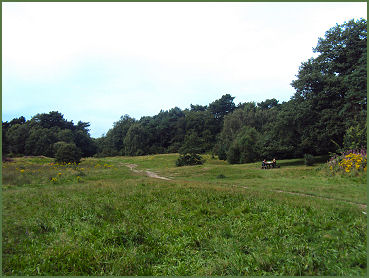Frankby
The Wirral hamlet of Frankby, which was mentioned in the Domesday Book, is situated near to the seaside town of West Kirby.
The name Frankby derives, in common with many Wirral villages, from the Old Norse language and means Frankis-byr, (Frenchman's farm).
The writer, preacher, suffragette and former local inhabitant Dr Maud Royden (1876–1956) is buried in the local church St John the Divine, which was founded in 1861. The village war memorial is situated in the grounds of the church.
Frankby Village Conservation Area was designated in October 1974. The Conservation Area focuses on Frankby Green and those roads that immediately surround it. There are five grade II listed buildings within the village: Yew Tree Farm, Old Post Office, The Half Inn House, 4 The Nook and Well House Farm.
Royden Park
 Attractive Royden Park at Frankby was named after local landowner Sir Ernest Royden, the park, which lies adjacent to Thurstaston Common, is now jointly owned by the National Trust and Wirral Borough Council and offers a wide range of activities and facilities.
Attractive Royden Park at Frankby was named after local landowner Sir Ernest Royden, the park, which lies adjacent to Thurstaston Common, is now jointly owned by the National Trust and Wirral Borough Council and offers a wide range of activities and facilities.
Until the mid-nineteenth century the site of Royden Park was still largely used as farmland. However, by 1844 there were in existence areas of 'plantation' which were to form the basis of a parkland landscape which still exists today.
The land was purchased in 1865 by Septimus Ledward Esq. J.P. who built a sandstone house on the site were an ancient tithebarn had stood. The house was erected between 1868 and 1870 and the surrounding grounds were laid out with gardens and glasshouses, a dovecote and a bowling green. The park was acquired in 1961 by Hoylake Urban District Council for use as 'public open space'.
 Royden Park, a holder of the coveted Green Flag award, now comprises over 26 hectares of mixed deciduous and conifer woodlands, meadows, fishing mere and wetland mere.
Royden Park, a holder of the coveted Green Flag award, now comprises over 26 hectares of mixed deciduous and conifer woodlands, meadows, fishing mere and wetland mere.
The two rhododendron-lined meres at Royden Park are particularly beautiful in springtime and provide nesting sites for Moorhen, Little Grebe, and occasionally for Mallard. Roodee Mere (pictured above left) holds water all year, but Frankby Mere dries out during the summer months, offering a suitable habitat for colonising plants such as Goat Willow, Reedmace and Yellow Flag.
Birds which are regularly sited around the Mere and meadow areas include Chiffchaff, Willow Warbler and Green Woodpecker. Around the meres and meadows are woodland plantations of Scots and Corsican Pine, Turkey Oak, Birch and rhododendron.
Royden Park Miniature Railways consist of two steam powered passenger locomotives which operate in the park. These are a combined 3.1/2" & 5" Raised Track and a Ground Level 7.1/4". Royden Park Miniature Railways is open most Sundays, 1pm to 4pm (weather and personnel permitting).
 There is also a visitor centre and Walled Nature Garden, (pictured right) situated near the car park and miniature railway.
There is also a visitor centre and Walled Nature Garden, (pictured right) situated near the car park and miniature railway.
Arts and crafts fairs are held during bank holiday weekends.
Within the grounds is a large Mock Tudor house known as 'Hillbark', It now operates as a luxury hotel and conference centre. The house was built for soap manufacturer Robert Hudson in 1891 and originally stood at Bidston Hill. It was designed by Edward Oult, who also designed houses in Port Sunlight Village and was inspired by century Little Moreton Hall in Cheshire. Hillbark was sold in 1921 to Sir Ernest Royden and in 1928 was moved to its present site, brick by brick, finally being completed in 1931.
The house contains a sixteenth century fireplace, once part of a house belonging to Sir Walter Raleigh. a set of William Morris stained glass windows and a pair of thirteenth century church screen doors; the library was originally in a stately home in Gloucestershire; and the Yellow Room restaurant contains a magnificent 1795 Robert Adam fire surround.
